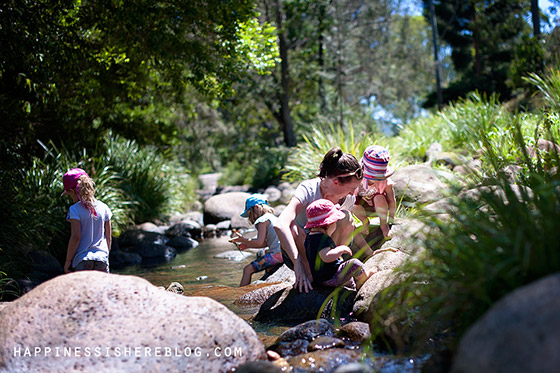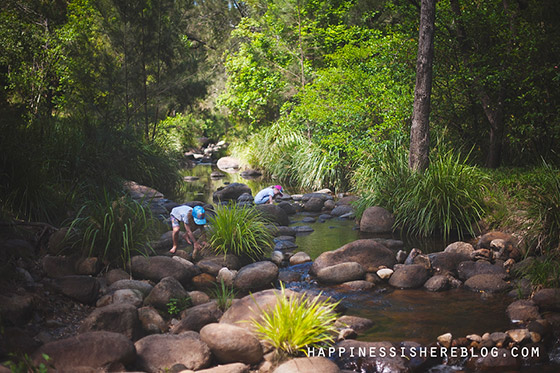
11 Reasons I’m NOT Teaching My Children
![]()

As a home educating parent, it might surprise you to hear that I am NOT teaching my kids. Isn’t that what people do when they don’t send their kids to school? Nope! We do life. And in life there is very little call for teaching in the sense that school sees teaching (teacher delivering information to students who may or may not be interested, and then testing their knowledge).
Make no mistake, we love learning around here. We’re learning all day every day, but that’s an entirely different thing to teaching.
If you are overwhelmed because you think that forgoing school means you have to take on a teacher role, the news is good! There’s no need to be a teacher, or to actively set out to ‘teach’ your children. In fact, it’s better if you don’t!
Why?
Here’s 11 reasons I’m NOT teaching my children…
1. They Don’t Want to be Taught
Firstly, kids don’t actually want to be taught. That doesn’t stop adults wanting to teach them of course, but shouldn’t the person being subjected to teaching have a say? Shouldn’t it be a choice? If you stopped concerning yourself with finding ways to teach children things and instead let them learn on their own, you would see that they very rarely ask for direct teaching. Sometimes they do if they are needing help with a specific skill, but that is very different to someone deciding for them what they should know, when they should know it, and how they should learn it. Children ask mostly for information from adults about things they are curious about, not instruction.
I know some people believe adults are superior to children and know better what they should learn, but I am not one of them.
2. They Don’t Need to be Taught
Apart from not wanting to be taught, children don’t even need to be taught! Children are perfectly capable of following their interests and curiosity and educating themselves. They will learn whatever they need to learn for their life in this way.

“Children are biologically predisposed to take charge of their own education. When they are provided with the freedom and means to pursue their own interests, in safe settings, they bloom and develop along diverse and unpredictable paths, and they acquire the skills and confidence required to meet life’s challenges. In such an environment, children ask for any help they may need from adults. There is no need for forced lessons, lectures, assignments, tests, grades, segregation by age into classrooms, or any of the other trappings of our standard, compulsory system of schooling. All of these, in fact, interfere with children’s natural ways of learning.” -Peter Gray, Free to Learn
3. Learning Should Be Consensual
I don’t feel learning is something that I should force on another human. Just as it would make me pretty annoyed to have someone tell me what I needed to learn, and how much time I had to spend doing it. Children deserve the same freedom of thought as adults. The same control over their own lives and minds. Trying to force learning is not even practical, you can’t control what someone cares about.
“The question I have been trying to answer for many years is: Why don’t they learn what we teach them? The answer I have come to boils down to this: Because we teach them–that is, try to control the contents of their minds.” -John Holt, How Children Fail
4. Humans Don’t Learn Through Teaching
How often as an adult do you seek out direct teaching to learn something new? Probably very infrequently. Instead, you google a question, talk to people about it, read some books, observe others who have the skills you want to learn, watch a video online, practice, any number of things! People learn best, as they always have, through observing and doing. Knowledge was passed from one generation to the next by children being included in the daily life of their community so that they learned the skills they needed from a young age. Only relatively recently did we get the absurd idea that we need to lock children away from life in a classroom so that they can memorise facts devoid of context. I would rather support my children to learn how they were biologically designed to.

5. I’m Not a Teacher
A teacher in a school must try to get a class of children to learn the curriculum. I’m not interested in a curriculum. I don’t believe in a one-size-fits-all approach to education, and it’s not my goal to fill their heads with facts. I’m not a teacher, and I don’t want to be. I’m a supporter and facilitator of learning, but it’s their own journey, not mine.
“Unschooling is not about the discovery of any particular body of knowledge. It is about the discovery of self.” -Ben Hewitt, Home Grown
6. I Trust Them
I have total trust in my children’s abilities. I’m not worried about them being ‘uneducated’. Children are amazing! I trust their innate love of learning that has been there since the day they were born. If that process is not interfered with, they continue to follow their passions and learn all they need to know for their life.

7. I Don’t Know Better Than Them What They Need to Know
Who better to know what knowledge a person needs, or is interested in, than the person themselves? I don’t presume to know my children better than they know themselves.
“Since we can’t know what knowledge will be most needed in the future, it is senseless to try to teach it in advance. Instead, we should try to turn out people who love learning so much and learn so well that they will be able to learn whatever needs to be learned.” -John Holt
School far too often kills that love of learning, making it a very ineffective way to raise passionate, self-directed learners. No thank you, we won’t be signing up for that.
8. Teaching Comes at a Cost
‘I think Jean Piaget said it beautifully: When you teach a child something, you take away forever his chance of discovering it for himself.’ -Magda Gerber
I want my children to make their own discoveries. To feel the pride and elation of fully owning their own learning. If I teach them what I think they should know, providing answers to questions they haven’t even asked yet, I take that experience away from them. That is the cost of teaching. Forced learning just does not even compare to self-discovery.
9. I Don’t Believe in Teaching
“Sister Agnes Patricia was the most influential teacher I ever knew. What I will always remember about her is her statement that there is no such thing as teaching — only learning. She believed that no teacher could ever teach anyone anything. Her task as a teacher was to create an environment in which the student can learn. Knowledge, she told us, standing very straight in her long black habit, her face framed by her white wimple, pointed at the top like the spire of a cathedral, needs to be pulled into the brain by the student, not pushed into it by the teacher. Knowledge is not to be forced on anyone. The brain has to be receptive, malleable, and most important, hungry for that knowledge.” -Monty Roberts
I tend to agree with the above quote. A person can teach as much as they want, but it doesn’t guarantee that any learning is happening. And most of the time in schools, it is not. Facts are memorised to pass tests, and then quickly forgotten. That’s not learning. If the purpose of school is in fact learning, then it is failing. But maybe that is not even the purpose?

10. I’m Thinking of the Future
What kind of people will be needed for the jobs of the future? Will they be those who can recite facts? Do things how they’ve always been done? Pass standardized tests? Conform? Know the same information as everyone else?
I don’t think so. The world needs problem solvers. Creative people who can think outside the box. Unique people of all different skillsets. Passionate people who want to make a difference. Confident people in charge of their own learning. Motivated people. You’re much less likely to get those skills being taught a curriculum in a school. What you get from a standardized education is standardized people. Creative self-directed learners, need a creative self-directed education.
“The illiterate of the 21st century will not be those who cannot read and write, but those who cannot learn, unlearn, and relearn” – Alvin Toffle
11. I Don’t Support Childism
Adults thinking they know what is best for kids and deciding what they should know, without their input or consent, is a fine example of childism. It is authoritarianism disguised as care. I respect my children, both their minds and bodies. It is not my right to have that much control over another person. I will not limit my children’s autonomy and freedom.

So no, I’m not teaching my children. Teaching isn’t my goal, learning is. They are not one and the same. Teaching undermines learning by making the focus on the teacher and their expectations and evaluations. But learning should not be about anyone else but the learner. What are they passionate about? What lights them up? How do they want to spend their childhood, and the rest of their life? That matters far more to me.
“Watch your child’s eyes, what makes them go dull and dead, what makes them brighten, quicken, glow with light. That is where learning lies.” -Carol Black, A Thousand Rivers





Comments
Love this:) Couldn’t agree more, which is pretty hard when your child actively chooses the opposite! Really loving your blog, thank you.
Thank you 🙂
I really enjoyed reading this. So happy I found you on instagram! I did not know about the term childism but it definitely rings true for me. I see my children as people and I in no way wish to control them. Thanks for writing.
♥
Hi, Sara.
Thank you for this. Truly inspiring.
I wanted to hear your take on those moments that most parents find that they need to “teach” their children. For example, in social interactions with other people or children. My daughters will argue about a specific toy or something like that. There are times that they settle it on their own but there have been moments that they ask for my help in solving the dispute or I don’t see that they have the tools to deal with it in a respectful matter. I feel like I’m using my experience to help them solve a problem & keep it fair for those involved. Would that be considered “teaching?” In your opinion, is this a word Unschoolers should not have in their vocabulary? I see that my daughters have been my teachers in so many ways. They have helped me learn so much about myself & the world around us. Again, thank you for what you do & I look forward to reading your response.
I think whenever you’re invited to help then it’s ok to help! I do still try to offer just the amount they ask for though. Have you read Nonviolent Communication by Marshall Rosenberg?? I found it super helpful for those kinds of parenting situations!!
I definitely think my daughters have been some of my biggest teachers too ♥ What a gift hey! But I think we use the word ‘teach’ in a different way than school would. We learn from them but they don’t force us to learn 🙂
Hi Sara,
I love this post!
I will even translate it into German, to let my father read it – we are arguing about school and unschooling at the moment but very slowly he starts to understand me and when my father understands, everybody can 🙂
I hope so much that there are more and more Germans reading here, maybe the schooling situation will change in our country as well. Thanks for writing this great post and this wunderful blog!
Maria (OstSeeRäuberBande)
Oh I hope it does change ♥
I would love it if you wrote a book! I’d get it for everyone I know, maybe then they would understand my beliefs, since I apparently cannot put them into words as well as you do!
This was so beautiful!! I resonated with every word you wrote. We are unschoolers too. I have two amazing teenagers now. I had them both read this and they loved it as well. We feel so blessed to know the things we know, and have the strength to go against the “norm” and live the life we feel is right for us. You are truly inspirational! 🙂
I have just come across this via Georgia Gravelle’s blog and I really agree with your views on education, and letting the child find out. Theirs to do and to find.
The world is very competitive. Although this is a very romantic idea, I am not brave enough to use my kids as test subjects for this philosophy. I fear that this might make this unprepared for the world.
How can they be unprepared for the world if they’re living IN world?
Here’s an article on how unschoolers turn out: https://www.psychologytoday.com/blog/freedom-learn/201406/survey-grown-unschoolers-i-overview-findings
I’m really just trying to get my head around unschooling, sorry to be an annoyance. So you do not teach your children things such as Maths (long division, fractions) English (verbs, nouns, personification, the lot) or any of those subjects taught in school? How does this help them in the future if they don’t understand or know how to multiply, how to correctly punctuate writing or to use proper grammar. Are they not tested in any way? So there is no schooling whatsoever? I’m sure this sounded terribly rude, I’m sorry, but I have a distant cousin who is about to begin ‘unschooling’ her five year old daughter, and son, so I’m just trying to get my mind around the whole process.
Not rude! All questions welcome 🙂
Yes it’s true we don’t teach those things. BUT that doesn’t mean they don’t learn them. They actually learn everything they need to on their own, when it becomes relevant to them. School has led us to believe that teaching is the source of learning but it’s just not. This is a brilliant read: http://carolblack.org/a-thousand-rivers
How much of what you were taught in school do you even remember? How much do you ever actually use? For me, it’s almost nothing and I was top of the class. I remember NONE of the maths I supposedly learned in high school and I have never had an occasion to use it. In my adult life, I have never been required to understand Shakespeare or point out the similes in a poem or recall the date Henry VIII did anything. I don’t believe schools generally even teach these things well as so many people leave school totally confused and terrified of maths or art or essay writing. I think I did well at school because I realised all I had to do was memorise things short-term then quickly forget them to make room for the next test – it was all totally meaningless.
My kids teach themselves maths by playing monopoly and other games, earning money by selling things at markets, saving and spending their money, building things, cooking, crafting, conversations… normal life. They read books because it’s fun. They love science because exploring the world is fascinating. And they learn so much more that schools have no time for.
I was the same! Very swotty at school but have struggled to find employment in the years since because unfortunately I left school with little confidence or practical skills. 3 years of French and 5 of German turned out to be practically useless too.
People laugh at me when I tell them that I didn’t teach my children during home education.
But I really didn’t.
However they don’t believe me because one daughter got a full scholarship at 11, to go to Chetham’s school of music.
I know nothing about music.
The other daughter is doing an MA at Sussex in politics.
Home education allows children to follow, in depth what they really love doing.
i see in the picture your children are young and therefore this freedom to explore, be in nature, learn by living life is much easier, of course if one parent is able to stay home with the kids. I would love to see what this looks like when the children are 10, 12, 15. Are your days still spent playing in the creeks, hiking and following each child’s desire? What are those learning desires for older children in our typical society? How do you prepare the older child for college in the unschooling model, no teaching, etc.
thank you.
Yet, I think that all this just about sums up what a good teacher is all about. It’s the term that we’ve managed to mess up.
Thank you for writing this! I’m going to share it with my children, and tell them that I didn’t know this at the outset, but they taught me along the way. And now they are confidently pursuing their own paths!
Thank you for this. Finding your website couldn’t have come at a better time for me.
Oh I’m glad 💗
I’m crying at the wisdom of this. xxxxx
Love this.